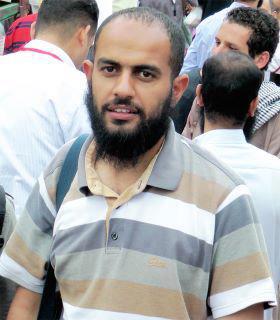
(Photo by Adham Youssef\File)
The Ministry of Interior announced Sunday that it had arrested 13 student protesters with alleged brotherhood affiliation in the clashes at Cairo University.
Clashes broke out between Cairo University students and administrative security guards on Sunday after a group of students attempted to climb a fence at the Faculty of Commerce and the administrative security stopped them, according to Mohamed Nagi, researcher with the Association of Freedom of Thought and Expression (AFTE).
Arrested students were charged with rioting. Among those arrested was Yahia Mahmoud Al-Ghozlan, son of Brotherhood leader Mahmoud Al-Ghozlan.
Yahia Al-Ghozlan, 21, was allegedly leading the protest and inciting other students to cause riots, according to statements made by the interior ministry spokesperson Hany Abdel Latif to satellite channel ONTV Monday morning.
Mahmoud Al-Ghozlan is among 14 defendants sentenced to death on 11 April by Judge Nagy Shehata, in the case known as “Rabaa Operations Room”.
Activist group Students Against the Coup (SAC) announced in a statement Sunday night its complete rejection of the “terrorist attack” on the Cairo University students earlier that day.
“We consider this a crime that deserves punishment, and we won’t just let it pass. We assure everyone that this oppression will not break our will,” the statement added. “The students will escalate in the coming few days to protest the oppression of students and the recent executions.”
SAC posted photos of the incident on its official page, showing violent clashes taking place between what the group referred to as “armed thugs” and the students.
“Tens of students and administrative security guards were injured in yesterday’s events,” said Nagi.
Nagi further stated that police forces stationed outside the university gates did not enter the campus, and those arrested were handed over to the police by the administrative security.
The interior ministry confirmed that all students were arrested from inside the campus by the administrative security.
The administrative security consists of regular civilians associated with the university, and entrusted with its internal security, according to Nagi.
In a phone interview on satellite channel ONTV Monday morning, Major General Hany Abdel Latif said that the current academic semester was relatively stable due to the strong coordination between the university’s administrative security and police forces stationed outside the university.
“Brotherhood-affiliated students started rioting, and the administrative security interfered to stop them,” explained Abdel Latif.
He also added that there was a correlation between student protests and the execution of several Muslim Brotherhood leaders.
Students organised demonstrations in several university campuses on Sunday including Cairo University and Al-Azhar University, calling for the release of detained students.
